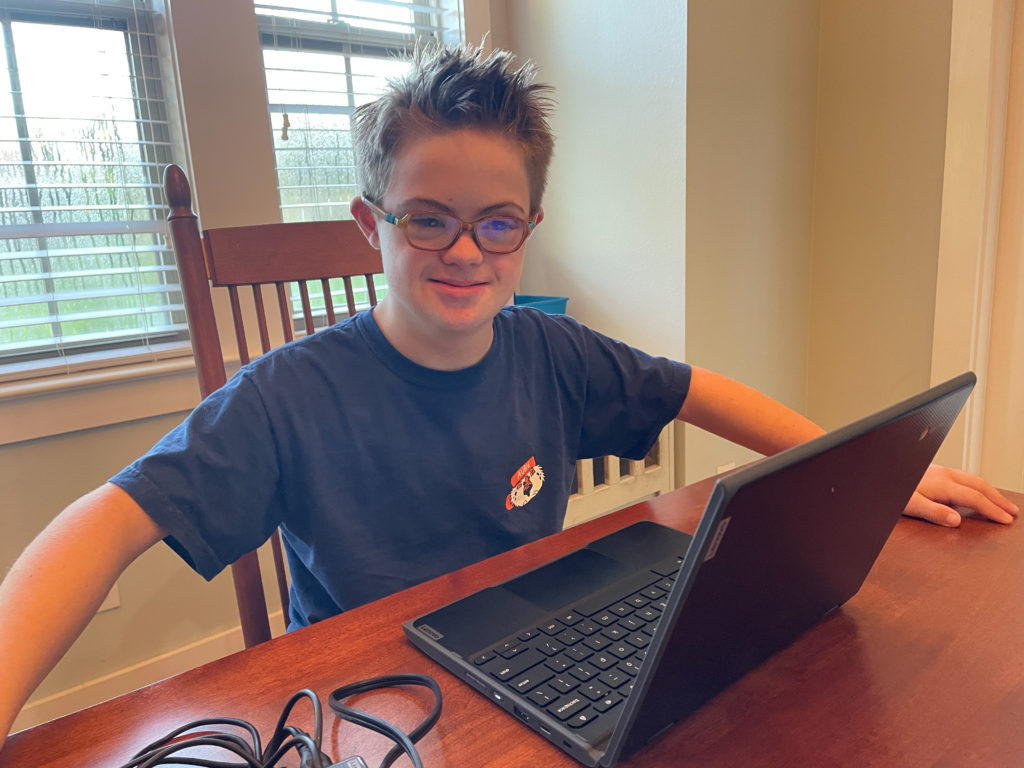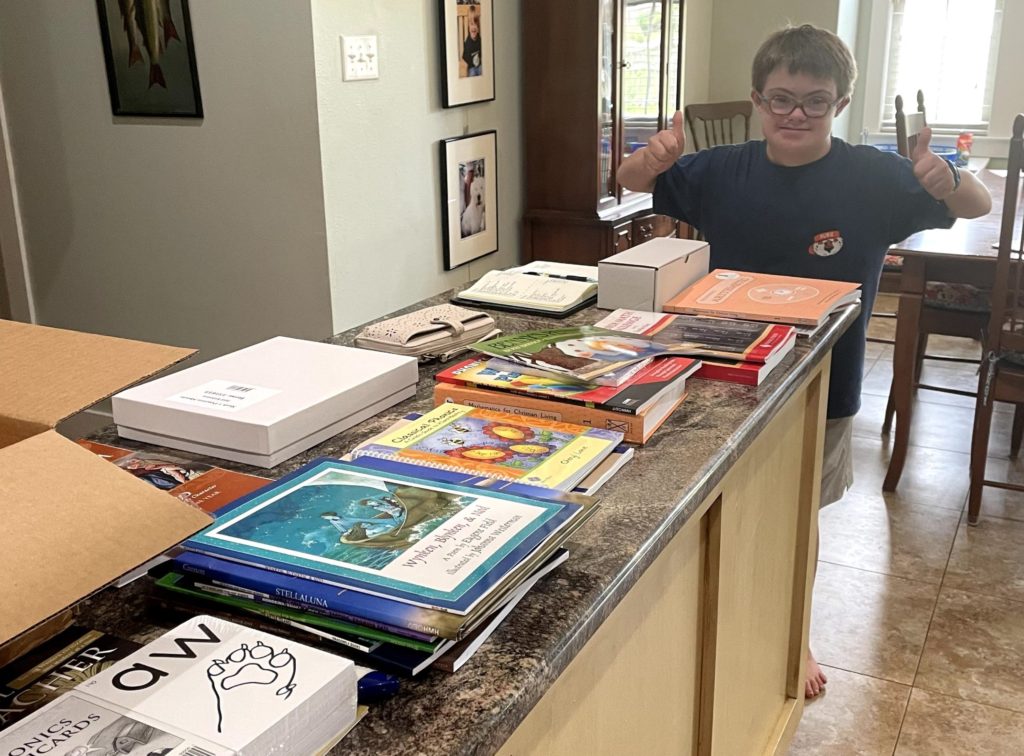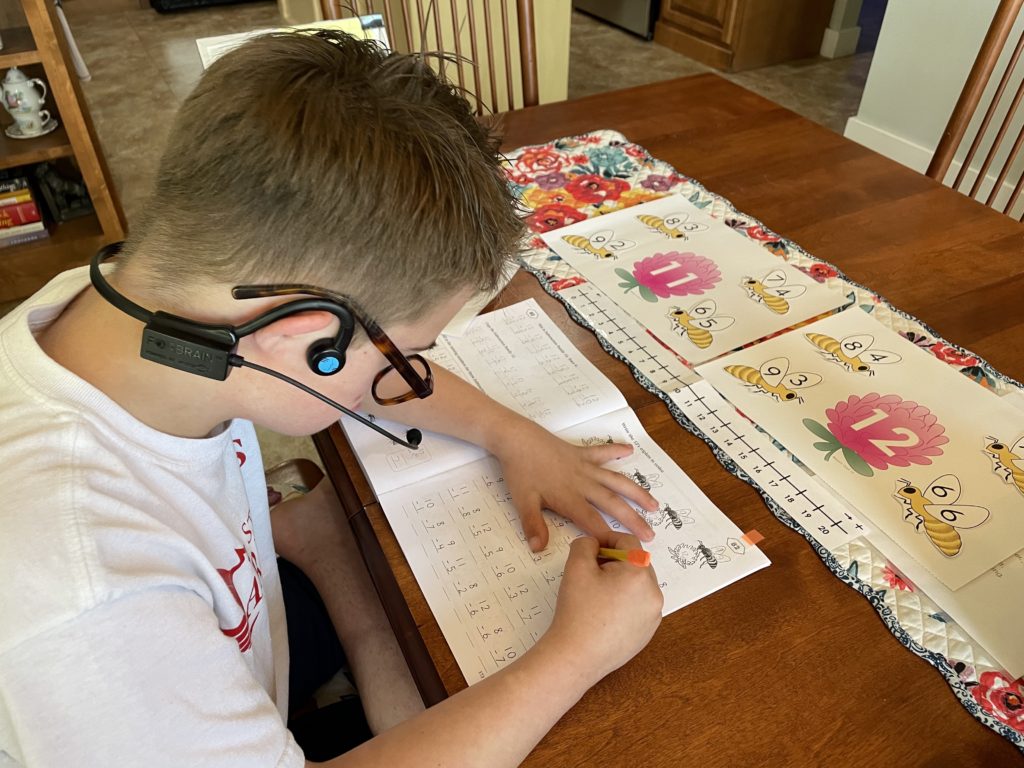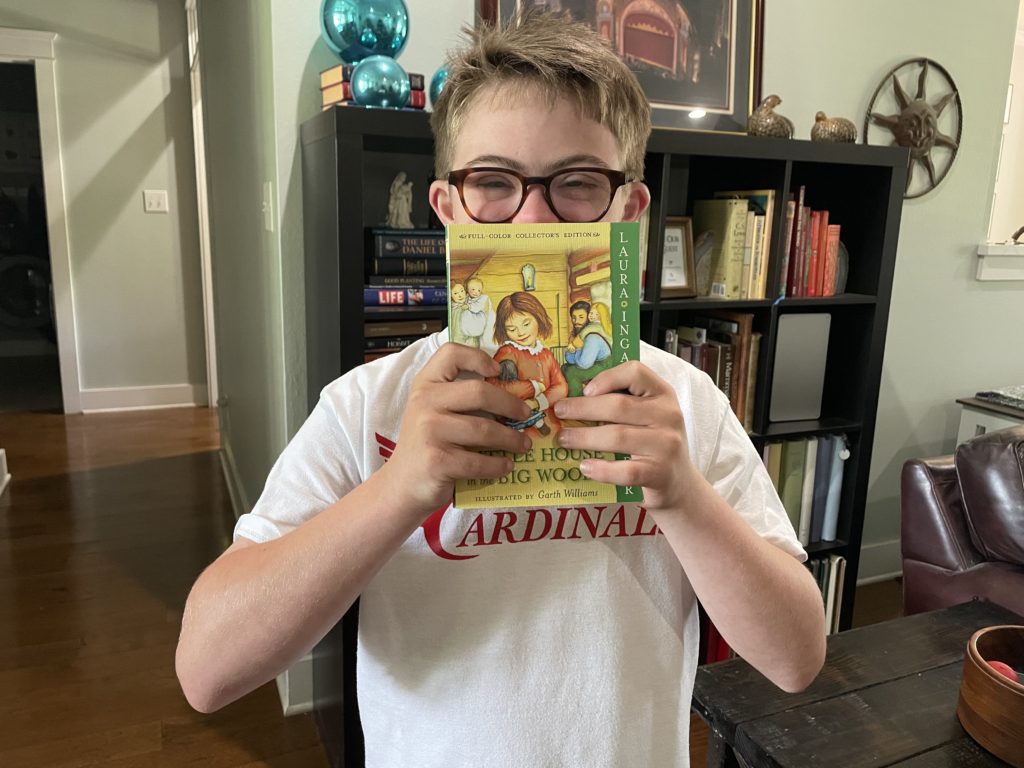Last September, I fell accidentally into homeschooling my child with Down syndrome. Two years ago, I would never have believed I would choose, much less enjoy, homeschooling Nathan. As Mr. Andi has declared quite a few times, “I’d have lost money on that bet!” I simply never had the desire and I was pretty sure I didn’t have the patience to be my child’s teacher, yet here we are.
Why I Chose to Homeschool My Son with Down Syndrome
When the 2020-2021 school year began, we sent Nathan to school. I was terrified but also overwhelmed and it seemed like the best choice at the time. A year later, the Delta variant of Covid-19 was burning through our community, and I was frightened again. We spoke to Nathan’s pediatrician and another physician friend on the front lines and they both were concerned; they felt that with Nathan’s history of hospitalization for pneumonia, we should consider virtual school temporarily, just until the wave had “washed over” our community. The school system worked with us to make this change at the absolute last minute and also offered to hold an IEP meeting as soon as we felt safe about him returning so that he could potentially transfer back early. They were fantastic, and I was grateful.

I absolutely LOVED Nathan’s virtual school special education teacher. He did very well with the asynchronous work (i.e., done on his own time) and the sessions one-on-one with the teacher, but not as well in sessions that included other students. The virtual group format just didn’t work for him. I had been adding some extra work to his daily load – partly for reinforcement and partly to keep him from just playing with trucks for hours on end – and I started thinking maybe homeschooling wouldn’t be all that bad. We continued virtual school but I also pulled out a lot of information on homeschooling I’d accumulated a year earlier at the beginning of the pandemic. A few weeks into the school year, we withdrew Nathan, and I cried when we said goodbye to his virtual teacher…and most of the rest of that day.
How I Chose a Homeschool Curriculum for Special Learning Needs
The curriculum I chose for Nathan is from Memoria Press called Simply Classical. It was developed by Cheryl Swope, a former special educator who homeschooled her adopted twin children who each had significant learning challenges. I read Cheryl’s book, Simply Classical, in the summer of 2020 (and then read it again before pulling him out of public school) and her approach appealed to me. I didn’t want a primarily computer-based program, and Simply Classical is “old school” with books and paper worksheets. They also made it easy to figure out how to place Nathan and offered step-by-step teaching guides that didn’t overwhelm me.

We are about to complete his first school year with Simply Classical and I am still using the curriculum guide that came with the program. When I started homeschooling I was afraid and overwhelmed and was comforted by being able to “open and go”; now I use the curriculum guide as a baseline and tweak it in ways that are more individualized. Instead of a lifeline as it was in the beginning, it’s now more of a template. I made some mistakes along the way with his curriculum – the biggest was placing Nathan in a math level that was too easy for him. Instead of skipping ahead to where I thought he should be, though, I decided repetition would be good and we simply sped up the pace of his lessons, completing two years of math in one.
Our biggest challenge has been in language arts. His ability to read far exceeds his ability to comprehend what he is reading, so using a standard grade-level curriculum for him won’t work. He also doesn’t yet have the speech and language skills to accompany his strong reading skills. Cheryl Swope still works with Memoria Press and the Simply Classical curriculum and she gave me some excellent advice on how to help bring up those lower-level skills while still forging ahead in the areas where he is strong – that’s another reason why I love the curriculum, the guidance they provided in the beginning and continue to provide today.
What I’ve Learned
Working directly with Nathan every day, I became much more in tune with what his specific challenges are and gained a better understanding of his strengths. Here are a couple of simple examples:
- Instead of vaguely thinking, “He’s not great at spelling” I could see specifically what he was doing wrong in many cases. For a simple example, a word like “halt” he might spell “hait” because a typed “l” looks similar to an “i” in a textbook. I now test him orally on spelling words, rather than on paper, after he’s been practicing the words both orally and on paper. He makes fewer mistakes that way and gets practice in a simple form of “public speaking”. He still isn’t a great speller, but he is more confident writing words and sentences, which is a plus.
- I realized that in math, he needs a LOT of repetition of basic facts. For example, he quickly completes the process of three-digit addition with carrying, but will often get the wrong answer because he’ll miss a basic math fact. For instance, 59+23=82 but he might come up with 81 because he would think that 9+3=11. Flashcards will be our constant companion this summer. 😉

I’m also much more aware of how processing speed impacts Nathan’s learning. If you think of brains like computers, you know that a computer with a slower processing speed is going to have a lot more trouble with big tasks, such as video editing, than a faster one. Because we aren’t limited by a school’s schedule, if he shuts down because he is having trouble with something we can take a break – a long one if necessary – and there’s no bell dictating when we can or should return to it. His public school teachers could take breaks or switch gears to some extent, but the nature of the school day sets limits on how much they could realistically do.
The most surprising benefit of homeschooling is improving Nathan’s speech and language. He is still significantly delayed but has made big improvements since we started homeschooling. He still receives private speech therapy and his therapist backs me up on this! I’m not doing anything new or different with respect to speech “homework” from what we were doing before, but I do have a theory as to why he is improving more quickly. When he was in public school, he was surrounded all day by other children and many adults who weren’t able to decode his speech as well as his family. He has always been hesitant to speak if he thought he wouldn’t be understood, so I believe he just didn’t talk as much at school. With me all day, he’s never “shy” about speaking. If more speaking leads to better speaking then just being with me more makes a difference.
What Our Future Homeschool Plans Are
For now, I will continue to homeschool Nathan. One of the big benefits to public school over the years was positive peer modeling, but he is due to enter middle school in our district this fall, and let’s just be honest – middle school is a minefield for everyone, so I’d prefer to just keep him out of it altogether. With that thought in mind, I’m (probably) committed to at least two more years of homeschooling; after that, we’ll take it one year at a time.
Because his curriculum is based on a classical education model, art, music, Latin, and mythology are all included. He’ll start a basic level of Latin in the fall (yes, really!), and it’s recommended that he begin some sort of music instruction, as well. Sarah Kate has pulled out her clarinet and right now as I type is attempting to show him a few basics; he’ll try a free beginner band class a few times this summer. I have no idea how it will go, but as with so many other things our kids have done over the years, it’s worth it to let him try.

A Note About Public School: I was not unhappy with our public school system or any teacher, aide, or administrator there. We had wonderful experiences with everyone and I can confidently say that they cared for Nathan and had his best interests in mind throughout his years in public school. I also don’t have anything negative to say about the school system’s approach to COVID – in fact, I’d go so far as to say that our school system could – and should! – have been a model for the rest of the country. Just wanted to clear that up. 😉
Note: I am not in any way affiliated with Simply Classical or Memoria Press other than purchasing their products, and I do not receive compensation of any kind for recommending their curricula. The link above to the book, Simply Classical, is an Amazon affiliate link, but I purchased the book itself with my own money in 2021. It is also available through the Memoria Press website.
